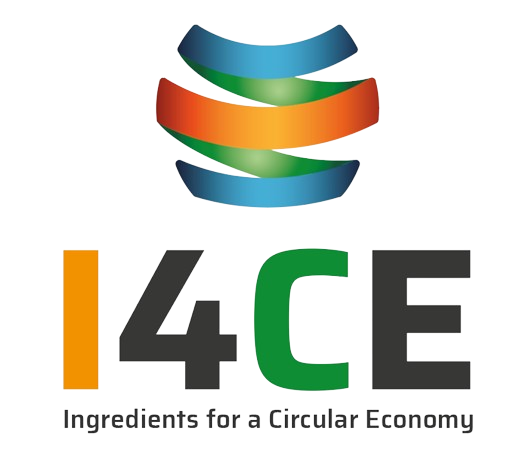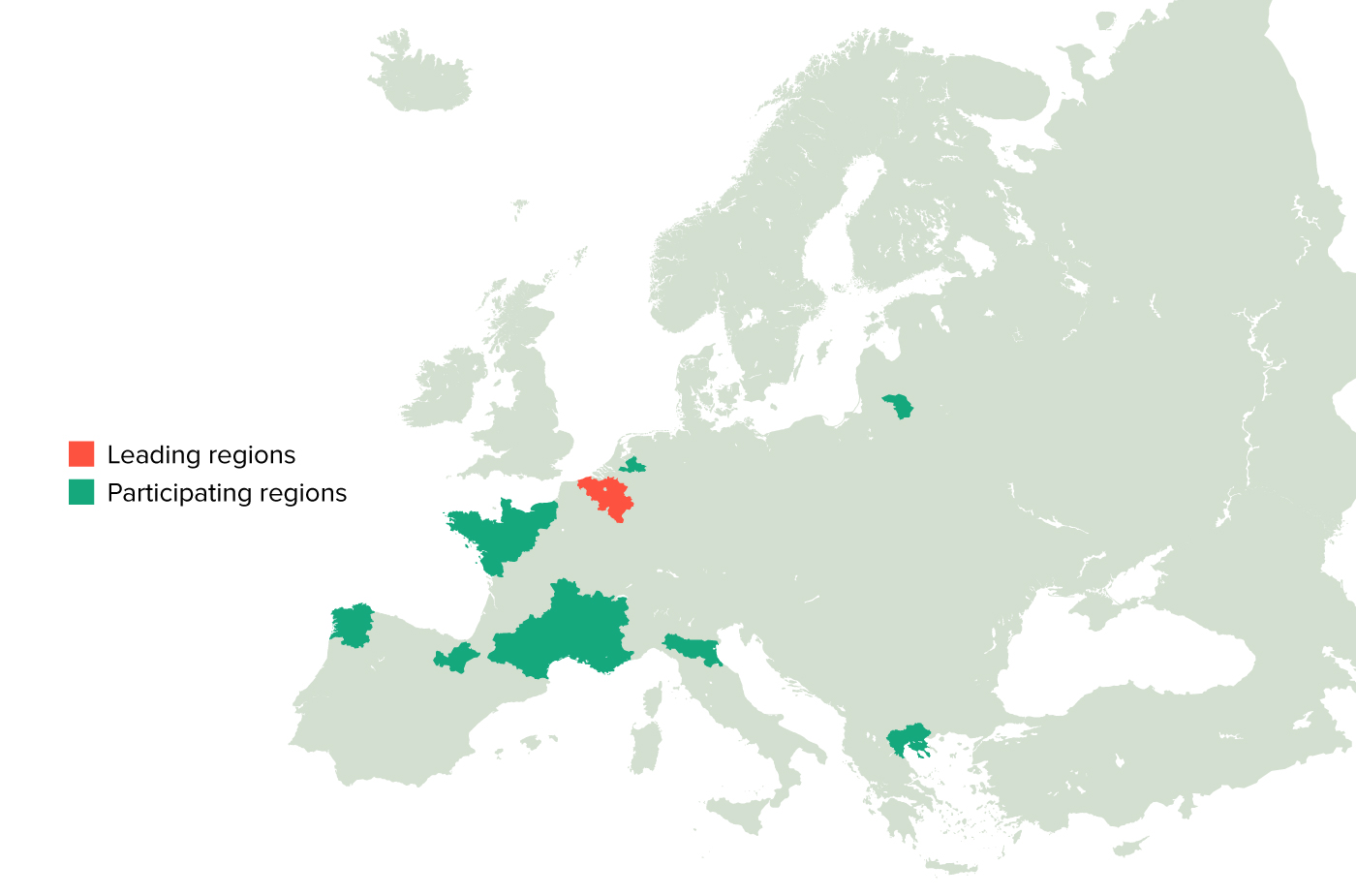Context
I4CE is an interregional partnership composed mainly by agri-food clusters to represent companies (mainly SMEs), researchers, innovators, economic developers, who are specialised in the agri-food sector, and more particularly in the production of innovative ingredients (nutritional, technical, functional), produced from bio-based raw materials (conventional, unconventional, new) or through new techniques valorising side streams (by-products/co-products) intended for food processing industry and non-food applications.
Exploring new routes to new ingredients, for new applications and uses, with new raw materials and new technologies, meeting new consumer needs, and complying with the circular economy principles. The building of a strong thematic network, with the necessary skills and competences, is essential to accelerate the development and commercialisation of novel and/or improved nutritional, technical and functional ingredients, while fostering cross-technology integration, cross-sectoral applications and circularity.
The goal of the S3 I4CE partnerships is to foster innovation and sustainability in the agri-food sector. The partnership strengthens the circularity by looking for new promising alternative ingredients and/or valorising side streams from the agri-food value chain into valuable ingredients for food, feed and other relevant sectors. This approach helps agri-food industries face challenges, improve efficiency in their production processes, optimize resource use, and utilize raw materials more effectively.
Year established: 2018

Regions (lead and partner)
- Leading regions: Wallonia (BE), Flanders (BE)
- Participating regions: Bretagne (FR), Normandy (FR), Pays de la Loire (FR), South Region (Provence-Alpes-Côte d'Azur) (FR), Occitanie (FR), Auvergne Rhône-Alpes (FR), Central Macedonia (EL), Emilia Romagna (IT), Galicia (ES), Navarra (ES), Gelderland (NL), Central Lithuania (LT), Mazowieckie (PL)

Mission
I4CE supports the development of innovative ingredients for cross sectoral applications, while fostering circularity.
The Partnership addresses four challenges:
- Emerging trends in food and drink consumption: requests for health benefits nutrition and improved nutritional balance; requests for natural products and organic foods, plant-based and green consumption; search for increased convenience.
- Industrial efficiency: agri-food industry and ingredients producing companies in particular need to reach higher efficiency, regarding key-aspects such as raw material utilisation, energy consumption, quality, safety and security, traceability, circularity and digital transformation.
- Circularity and sustainability: agri-food industry searches for better resources-efficient production systems, across the farm-to-fork chain, by valorising agrifood side-streams and by-products, by designing true circular strategies.
- Policy and regulations: innovating in the food sector is exposed to challenging regulatory matters, especially when new ingredients are produced by non-conventional technologies and from non-conventional side-streams.
Objectives
- Boosting the Economy: stimulating promising value chains in various thematic, sectorial, applications areas, supporting agri-food companies in their development while contributing to sustainable & circular food/non-food systems that meets the changing needs of the consumer. Accelerating the development of novel and/or improved biobased ingredients.
- Developing sustainable innovation: enabling access to new, innovative, nutritional, healthy, high added value and/or techno-functional ingredients and compounds, by valorising by-products, ensuring circularity of the agri-food ecosystem.
- Catalysing the Ecosystem: steering a dedicated community of stakeholders (Clusters, RTOs, SMEs, etc) active and interested by the I4CE value chains, a growing segment of the future of food and sustainable nutrition.
Cooperating across Europe: bringing ideas, benchmarks, best practices, opportunities, partners and solutions to respond to critical industrial disruptions and societal challenges.
Main activities
The following main activities are outline for the partnership:
- Strategic roadmap and partnership development
- Lobbying and interaction with the EC and other stakeholders
- Working group projects generation
- Knowledge transfer
- Communication
- Management of the partnership
I4CE focuses on the generation of nutritional and functional ingredients and food additives.

Organisations involved
Partners:
- Wagralim (BE)
- Flanders'food (BE)
- ATE Cluster (EL)
- Region of Central Macedonia (EL)
- Clusaga (ES)
- Anfaco (ES)
- Nagrifood (ES)
- CNTA (ES)
- Valorial (FR)
- Innov'alliance (FR)
- Clust-ER Agro-Alimentare (IT)
- Smart Food Cluster (LT)
- Foodvalley (NL)
- Unimos (PL)
Associated Organisations:
- Wallonia (BE): ULiège, Gembloux Agro Biotech, Smart Gastronomy Lab (SGL), UCLouvain, Celabor (RTO)
- Flanders: Food Pilot (pilot facility), ILVO (RTO), BBEPP (pilot facility)
- Emilia Romagna (IT): ART-ER, University of Parma, University of Bologna (UNIBO), University Modena-Reggio Emilia
- Bretagne (FR): UBO Rennes, Agro Rennes-Angers, Bretagne Développement Innovation (BDI)
- Galicia (ES): National Technical Centre of Conservation Fisheries Products CECOPESCA, Meat Technology Centre Foundation CTC, Dairy and Food Technology Training and Research Centre APLTA, Centre for Research, Transference, and Innovation CITI, Universities of Santiago de Compostela (USC), Vigo (UV) e A Coruña (UDC)
- Sud-Provence-Alpes-Côte d’Azur (FR): CTCPA (Pilot plant), Terralia senso (Sensory process and evaluation), Avignon University
- Central Macedonia (EL): CERTH (RTO)
Shared smart specialisation areas
- Agri-Food supply chains of the future, incl. nutritional & functional ingredients
- Healthy food & ingredients
- Food safety, quality, traceability, high-quality AF industry
- Sustainable food products & systems
- Sea-related products
Related projects
- B-Resilient (Euroclusters): The B-Resilient project aims to strengthen the resilience of food-producing and processing SMEs by linking the agri-food ecosystem with sectors focused on bio-based ingredients. This cross-sector collaboration seeks to create new products that meet consumer demand. The project targets several key areas: enhancing EU industrial ecosystems through networking, advancing a greener and more digital economy, training the workforce while attracting talent, expanding international access to supply and value chains, and raising awareness to engage more SMEs. It also emphasizes the optimal use of biomass and digital solutions, promoting a zero waste, circular economy approach to improve the competitiveness and sustainability of food processing SMEs. https://www.wagralim.be/en/nos-projets-innovation/b-resilient-2/
- Biotech4Food (I3): The BIOTECH4FOOD project seeks to boost investment and innovation in value chains linking biotechnology with the agro-food industry through interregional cooperation. Its goals are to make the agri-food sector more sustainable by promoting circular and efficient use of biomass, aligning with consumer needs, and addressing nutritional, protein, and health challenges for a sustainable food system https://i4ce.eu/biotech4food/.
Contact
- Gus Verhaeghe, Flanders' FOOD, Gus.Verhaeghe@flandersfood.com.
- Yuan Chai, Wagralim, yuan.chai@wagralim.be.
- Betty Milano, Wagralim, betty.milano@wagralim.be.

